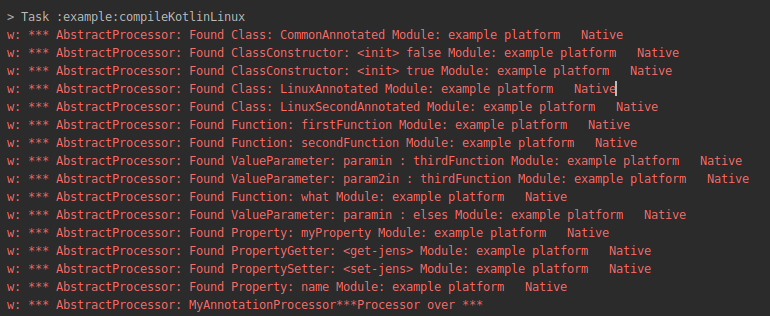I wrote an annotation processing libary that can detect annotations in Kotlin Native/JS and Jvm projects, because Kapt is only working with KotlinJvm. The library can be used in Kotlin Compiler plugins. Tested with Kotlin 1.3.41, 1.3.50, 1.3.70
It can detect annotations with following targets:
(CLASS,FUNCTION,PROPERTY,VALUE_PARAMETER,PROPERTY_GETTER,PROPERTY_GETTER,CONSTRUCTOR)
(ANNOTATION_CLASS,TYPE_PARAMETER,FIELD,FILE,LocalVariable)
Example output of my example plugin on Kotlin Native:

-
Your project?
These are the instructions for v0.8.4, check Changelog for changes on the active development branch
Inside your compiler plugin, add the dependency from MavenCentral
repositories {
mavenCentral()
}
dependencies {
compile 'de.jensklingenberg:mpapt-runtime:0.8.4'
}- Create a class that extends de.jensklingenberg.mpapt.model.AbstractProcessor
class MpAptTestProcessor() : AbstractProcessor() {
- Add the names of your annotations that you want to detect:
override fun getSupportedAnnotationTypes(): Set<String> = setOf(TestClass::class.java.name, TestFunction::class.java.name)- Do something with detected annotations:
override fun process(roundEnvironment: RoundEnvironment) {
roundEnvironment.getElementsAnnotatedWith(TestClass::class.java.name).forEach {
when (it) {
is Element.ClassElement -> {
log("Found Class: " + it.classDescriptor.name + " Module: " + it.classDescriptor.module.simpleName() + " platform " + activeTargetPlatform.first().platformName)
}
}
}
roundEnvironment.getElementsAnnotatedWith(TestFunction::class.java.name).forEach {
when (it) {
is Element.FunctionElement -> {
log("Found Function: " + it.func.name + " Module: " + it.func.module.simpleName() + " platform " + activeTargetPlatform.first().platformName)
}
}
}
}- Init MpApt inside your ComponentRegistrar:
- Pass an instance of your processor and the CompilerConfiguration into MpAptProject
- Then add an instance of MpAptProject to the following extension classes:
Inside a Kotlin Native Compiler Plugin:
override fun registerProjectComponents(project: MockProject, configuration: CompilerConfiguration) {
val processor = MpAptTestProcessor()
val mpapt = MpAptProject(processor,configuration)
StorageComponentContainerContributor.registerExtension(project,mpapt)
IrGenerationExtension.registerExtension(project,mpapt)
}Inside a Kotlin JVM/JS Compiler Plugin:
override fun registerProjectComponents(
project: MockProject,
configuration: CompilerConfiguration
) {
val processor = MpAptTestProcessor()
val mpapt = MpAptProject(processor,configuration)
StorageComponentContainerContributor.registerExtension(project,mpapt)
ClassBuilderInterceptorExtension.registerExtension(project,mpapt)
JsSyntheticTranslateExtension.registerExtension(project,mpapt)
}- That's it
By default your processor is enabled for every target. You can override
isTargetPlatformSupported(platform: TargetPlatform): Booleanand return "true" if you want to support the target or "false" you don't.
override fun isTargetPlatformSupported(platform: TargetPlatform): Boolean {
val targetName = platform.first().platformName
return when (targetName) {
KotlinPlatformValues.JS -> true
KotlinPlatformValues.JVM -> true
KotlinPlatformValues.NATIVE -> {
return when (configuration.nativeTargetPlatformName()) {
KonanTargetValues.LINUX_X64, KonanTargetValues.MACOS_X64 -> {
true
}
else -> {
true
}
}
}
else -> {
log(targetName)
true
}
}
}You can distinguish between the native target platforms you want to support.
configuration.nativeTargetPlatformName() will get you the names of the Native Targets(macos_x64,linux_x64,etc). The values are defined in KonanTargetValues. It needs to be used only on Kotlin Native otherwise it will return an empty string
Feel free to send feedback on Twitter or file an issue or join the Kotlin Slack and the 
- demoProject - An example project that is using MpApt+KotlinPoet to generate code on KotlinJS
- annotations - A Kotlin Multiplatform project which contains test annotations
- example - A Kotlin Multiplatform project which applies a gradle plugin(de.jensklingenberg.mpapt) whichs triggers the compiler plugin.
- buildSrc - This module contains the gradle plugin which trigger the compiler plugin
- kotlin-plugin - This module contains the Kotlin Compiler Plugin for JVM/JS targets, it implements the kotlin-plugin-shared-module
- kotlin-compiler-native-plugin - This module contains the Kotlin Compiler Plugin for Native targets, it implements the kotlin-plugin-shared-module
- kotlin-plugin-shared Contains an implementation of MpApt
The CompileTest shows you, how you can use Kotlin Compile Testing to test your Processor/Compiler Plugin
- How to use a Kotlin Compiler Plugin from Gradle Plugin
- How to write a Kotlin Compiler Plugin
- How to debug Kotlin Compiler Plugin
- How to develop?
This project is licensed under the Apache License, Version 2.0 - see the LICENSE.md file for details
Copyright 2019 Jens Klingenberg
Licensed under the Apache License, Version 2.0 (the "License");
you may not use this file except in compliance with the License.
You may obtain a copy of the License at
http://www.apache.org/licenses/LICENSE-2.0
Unless required by applicable law or agreed to in writing, software
distributed under the License is distributed on an "AS IS" BASIS,
WITHOUT WARRANTIES OR CONDITIONS OF ANY KIND, either express or implied.
See the License for the specific language governing permissions and
limitations under the License.









